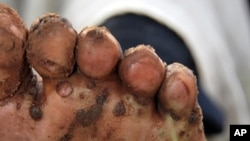NAIROBI, Kenya - An estimated 2.6 million Kenyans are infected with jiggers, a flea-like parasite that burrows under the skin. Left untreated, jiggers can lead to all kinds of secondary infections, loss of mobility and even death. Some 1.5 million children cannot go to school because of the scourge. A Kenyan organization has assisted in research for the world's first jiggers drug and has been holding medical clinics to help those suffering from the condition, which is linked to poverty and poor hygiene.
It is dubbed "the silent killer" because everyone wants to hide the condition. The feeling of shame at having it is unbearable.
Agnes Wayua knows this only too well. Her 10 children were infected with jiggers; one of her children and a grandchild died because of it.
"For that long time of jiggers and poverty, nobody recognized me in the village," she said. "Nobody could visit me or even greet me until they saw some signs of help. They began coming in one by one to join me because of what they are seeing. But some others even up to today gossip about me."
Help came from Ahadi Trust Kenya, an aid group aiming to wipe out jiggers in East Africa, provide support for those who have the condition, and reduce its stigma.
Stanley Kamau, Ahadi Trust Kenya's founder and executive director, says he and his group were targets of intense abuse from politicians and community members when they started, five years ago.
"I could not visit my village where I was born," he said. "I could not go to the schools where I went to school. The schools I had for many years contributed in building, they could not welcome me."
The parasites are usually found under the skin of the feet and hands. Children, who account for more than half the cases, are especially impacted. If their feet are badly infected, they cannot walk to school.
Ahadi Trust Kenya was eventually able to open medical camps where the affected come to get treatment and counseling.
Social worker Mourine Wangari Karanja is part of an army of volunteers who do what most people would refuse to do.
"I am doing this out of love," said Karanja. "When I was growing up, there were many people around me with jiggers. I used to watch my mother remove jiggers from these people. Now, I am a mother, I spoke to the health workers who gave me medicine to treat the ones who are infected."
Karanja and her colleagues treat jigger-infested body parts with soap, water, potassium permanganate, and lotion. There is no drug to cure jiggers, but a German researcher is developing a drug after working with Ahadi Trust Kenya.
The tide is turning. Where once Ahadi Trust Kenya and their clients were shunned, they are now becoming celebrities of sorts.
Miss World 2011, Miss Europe, Miss World Kenya and the grandson of former South African president Nelson Mandela all washed jigger-infested feet at the group's most recent medical clinic, thrilling the crowds with their presence.
It is dubbed "the silent killer" because everyone wants to hide the condition. The feeling of shame at having it is unbearable.
Agnes Wayua knows this only too well. Her 10 children were infected with jiggers; one of her children and a grandchild died because of it.
"For that long time of jiggers and poverty, nobody recognized me in the village," she said. "Nobody could visit me or even greet me until they saw some signs of help. They began coming in one by one to join me because of what they are seeing. But some others even up to today gossip about me."
Help came from Ahadi Trust Kenya, an aid group aiming to wipe out jiggers in East Africa, provide support for those who have the condition, and reduce its stigma.
Stanley Kamau, Ahadi Trust Kenya's founder and executive director, says he and his group were targets of intense abuse from politicians and community members when they started, five years ago.
"I could not visit my village where I was born," he said. "I could not go to the schools where I went to school. The schools I had for many years contributed in building, they could not welcome me."
The parasites are usually found under the skin of the feet and hands. Children, who account for more than half the cases, are especially impacted. If their feet are badly infected, they cannot walk to school.
Ahadi Trust Kenya was eventually able to open medical camps where the affected come to get treatment and counseling.
Social worker Mourine Wangari Karanja is part of an army of volunteers who do what most people would refuse to do.
"I am doing this out of love," said Karanja. "When I was growing up, there were many people around me with jiggers. I used to watch my mother remove jiggers from these people. Now, I am a mother, I spoke to the health workers who gave me medicine to treat the ones who are infected."
Karanja and her colleagues treat jigger-infested body parts with soap, water, potassium permanganate, and lotion. There is no drug to cure jiggers, but a German researcher is developing a drug after working with Ahadi Trust Kenya.
The tide is turning. Where once Ahadi Trust Kenya and their clients were shunned, they are now becoming celebrities of sorts.
Miss World 2011, Miss Europe, Miss World Kenya and the grandson of former South African president Nelson Mandela all washed jigger-infested feet at the group's most recent medical clinic, thrilling the crowds with their presence.




